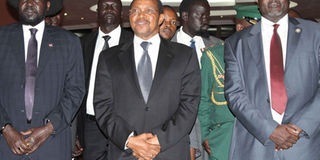S. Sudan leaders accept war ‘responsibility’

South Sudan President Salva Kiir (left), Tanzania's President Jakaya Kikwete (center) and South Sudan rebel leader Riek Machar (right) during talks on October 20, 2014 in Arusha. President Kiir and his arch-rival rebel chief Riek Machar said on October 21, 2014 they accepted mutual responsibility for a 10-month civil war in which thousands of people have been killed. FILE PHOTO | AFP
What you need to know:
- It was the first time the bitter rivals had met since signing a ceasefire in August in Ethiopia, which like three previous agreements swiftly collapsed.
- This time the two leaders said the now divided ruling party, the Sudan People’s Liberation Movement (SPLM), which brought the country independence after a long war with Khartoum, should be reunited.
ARUSHA
South Sudan President Salva Kiir and his arch-rival rebel chief Riek Machar said Tuesday they accepted mutual responsibility for a 10-month civil war in which thousands of people have been killed.
“The parties acknowledge a collective responsibility for the crisis in South Sudan that has taken a great toll on the lives and property of our people,” said the text of a deal signed by Kiir and his sacked former deputy Machar in the Tanzanian town of Arusha.
It was the first time the bitter rivals had met since signing a ceasefire in August in Ethiopia, which like three previous agreements swiftly collapsed.
Political and military leaders have repeatedly broken promises made under intense international pressure, including visits to South Sudan by UN chief Ban Ki-moon and US Secretary of State John Kerry.
This time the two leaders said the now divided ruling party, the Sudan People’s Liberation Movement (SPLM), which brought the country independence after a long war with Khartoum, should be reunited.
“A divided SPLM will automatically fragment the country along ethnic and regional fault lines,” the deal read, calling for “genuine and honest dialogue that puts the interest of the people and the nation above all.”
VOWED COMMITTMENT
President Kiir vowed commitment to “the peaceful resolution of the crisis” in the impoverished but oil rich nation, just three years old but riven by war.
“There is no reason for our people to suffer again after independence,” Mr Kiir added.
The talks in the northern Tanzanian tourist town of Arusha follow an invitation from President Jakaya Kikwete, who has also met separately with both leaders.
Thousands of people have been killed and almost two million have fled fighting between government troops, mutinous soldiers and ragtag militia forces divided along tribal lines.
The war has spread rapidly across the country and been marked by widespread human rights abuses and atrocities by both sides.
FAILED DEALS
Previous deals and promises between the pair have crumbled within days — and sometimes just hours — but Machar said he wanted this deal to last.
“We do not want this opportunity to go away like other opportunities before,” Mr Machar promised.
“We shall do our utmost to see that this process can be completed.”
The last deal in August ended days later when fighters downed a UN aid helicopter, killing three Russian crew members.




